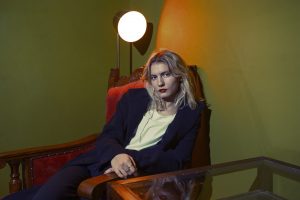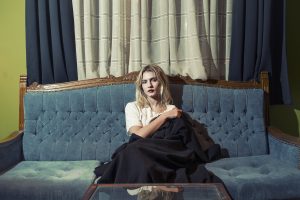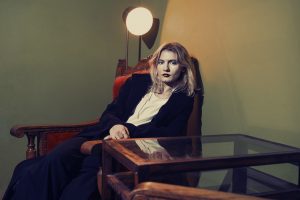Breakout Kosovo singer-songwriter Edona Vatoci was raised by female voices, though her latest song proves she’s already coming into her own.
“I write for myself, but I also want to write for women.”
Edona Vatoci’s romantic, eerie sound draws inspiration from a diverse musical palate from Bjork, to 90s Britney Spears, to traditional Albanian folk music, all brought together by the common thread of femininity. Vatoci is a woman to watch. Her new song and video “Miremengjes” was released last Tuesday. It is only her second song, but already she’s got a budding following in the region.
She has a vibrant, infectious energy that is as captivating to witness on stage as in person. At an outdoor performance last summer for Etno Muzikë e Re, she beautifully transformed traditional Albanian songs with keyboard synth and her mystical, warm melodies. It was addictive; she was the star of the night. In person, she’s fluttery and talkative, someone you’d be happy to bump into at Klubi M to share a beer.
But she wasn’t always so confident. Vatoci was born in Prishtina and grew up in a musical household. Her father played the clarinet, and her family was always playing traditional music on cassette tapes. She spent eight years in formal music school learning piano, but didn’t begin singing until she was fourteen. She was shy though, and experimented with her voice in private, until she surprised herself by signing up to partake in a televised singing competition.
“I went to the Voice of Albania at 16. My dad and mom said that the first time they heard me sing was on TV, so it was a surprise for them too. They had no idea I could do it.”

Photo: Atdhe Mulla
Around this time, Vatoci also began experimenting with different genres. While she was studying piano, she looked up to Nina Simone as an icon. Born in 1996, she also consumed the international pop hits of the 1990s and early 2000s. She eventually found herself drawn to the alternative scene, and to female voices in particular: prolific English singer-songwriter PJ Harvey, Albanian jazz and folk singer Elina Duni, and Vatoci’s all-time role model, the iconic Icelandic artist Bjork.
Around age 18 she began to write and record her own lyrics and melodies. She said she began to study musicians like Bjork on a professional level. Within a year, she had created something special of her own — “Hala” (Still), her 2015 breakout song.
“I was so shy. I went to Genc and Arber to play the song, and I was so nervous,” she said, referring to the musical Prishtina brothers Genc and Arber Salihu, who both produce and make music.
“I couldn’t even finish the song, I was too tense. It’s not that they’re harsh critics, it’s just their legacy… I was so sweaty, I was dripping,” she recollected.
But the brothers loved the song and Arber Salihu decided to record and produce it with Tomor Kuci. Despite Vatoci’s lack of funding, people in Kosovo’s creative community volunteered their resources to put together a video for “Hala,” a testament to the DIY nature of producing indie art in the country.
“It was a no budget video. There’s not that kind of industry here, with someone who signs you and takes care of these things. You have to take it over yourself. Arber and Genc were so helpful. Arber and Tomor Kuci did the orchestration. And I called a couple of other friends whose work I trust and enjoy.”
The video was directed by Noar Sahiti, someone she says is “of the new generation of brilliant directors of this country,” with costumes by local designer Venera Mustafa.
“Hala” was well received in the region and ended up getting Edona a nomination for best avant garde artist for the 2016 Top Channel Music award in Albania. Vatoci attended the awards ceremony alongside well-known artists such as Era Istrefi and Noizy, and remembered being one of the only artists present not from the ‘mainstream,’ though Vatoci herself rejects any strict division of genre. She spoke about international stars Rihanna and Frank Ocean and local Ferizaj rapper Buta as examples of modern blending of indie sensibilities with popular hip hop and rap. This is what’s special about her generation: the willingness to take in popular and alternative music. The two don’t have to be in conflict.
Still, Vatoci’s Top Channel nomination goes to show that people are craving an alternative, feminine sound.
“The youth want to represent their generation with this alternative vibe. They have the foreign bands and all, but there is a need for local representation. It’s a beautiful feeling to have somebody who lives around, who hangs out in the same places as you, and who makes the music you like,” Vatoci said.

Photo: Atdhe Mulla
She has Kosovo youth in mind when she writes, but she is particularly thoughtful towards with her female audience. Vatoci is a feminist, and says she was deeply influenced by her time working with Kosova Women’s Network, KWN, at age 17.
“I heard stories from women who didn’t know their struggle, their own voice, their own rights; who were told by society that women should shut up, hide our feelings, be good girls, and obey. ‘Don’t don’t talk about boys, you’re not supposed to explore yourself,’” she said about her time surveying women around the country for KWN’s publications and advocacy work.
Emotional self-exploration roots the theme of her new video, “Miremengjes,” released on December 27th. The song is simultaneously drony and sparkly, with her signature style of occasional, purposeful interjections of ghostly minor notes.
She describes the song as her own personal mantra to promote self healing. “I always wanted to touch upon the emotional and mental parts of the self. Depression isn’t taken seriously in Kosovo. I’m constantly telling myself in the song to use little things like water and grass and earth and food to promote healing. Just little things from the ground, to turn to when you’re feeling fragile. And it’s okay to feel fragile,” she said.
Vatoci will continue to write deeply personal lyrics about love and emotions. She said she sees this time in her life as a stage, somewhat akin to PJ Harvey’s growth as an artist.
“Harvey had to go through her emotional self inside her own bubble, and then when she was literary enough, she wrote about bigger issues. I feel that I’m not there yet. So right now I’m writing about my deepest emotions, treating them, and treating myself. I have a long way to go with it until I’m capable of taking on bigger causes,” she said.

Photo: Atdhe Mulla
Harvey, who visited Dokufest a few years ago, has even taken up Kosovo as a theme in her most recent work. In 2016 she released “The Wheel,” a video that was filmed in Kosovo. Vatoci has her reservations about it.
“I think ‘The Wheel’ shows only one side of Kosovo,” she said. “I’m against fetishizing a society and a country. Of course she’s right, we have trash. I think it’s a narrow view, though a true one. Kosovo is a country of trash and pollution and this and that, but it’s also a place with good energy and beautiful youth, and that should be shown too.”
Vatoci’s aesthetic is inspired by the female artists she grew up with, but it is also true to her own interactions with her world. In fact, her love for what she calls her “bipolar Prishtina” is the bedrock of her creative outlook.
“It’s crazy how beautiful it can be, how ugly it can be, how blood sucking it can be. The greyness can sometimes look so beautiful, and sometimes so freakin’ ugly. Colorful, young, fragile. Sometimes she’s an old lady who holds grudges against everybody, and sometimes she’s a beautiful girl with her hair and makeup done, feeling great, like #Iwokeuplike this.”

Photo: Atdhe Mulla
The introspective, emotional nature of Vatoci’s distinctive sound is satisfying a craving in Kosovo, and it’s exciting to witness. But what I found to be crystal clear is that Vatoci is already coming into her own voice as a creative, a feminist, and social critic. Still, as Vatoci said laughing, “I still have time to learn and to change. I’m only 20.”





